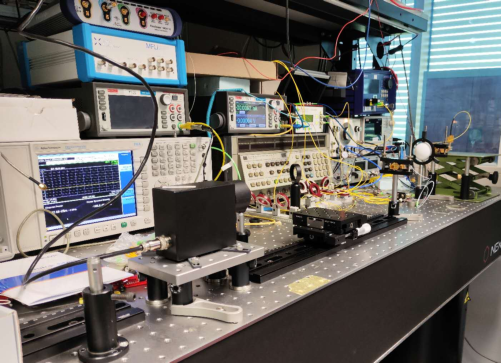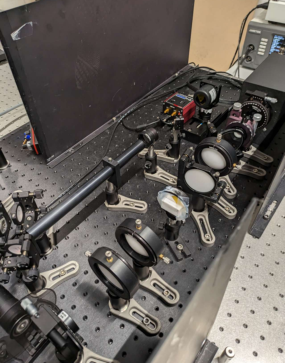WP 3 - THz and Photonic health sensors for monitoring
Lead: Technical University Eindhoven
Faculty: Electrical Engineering
THz and Photonic health sensors for monitoring
WP 3 focus on implementing terahertz and photonics sensor for monitoring obesity, diabetes and cancer patients. As monitoring patients becomes more holistic, it is essential to introduce different metrics from different sensors, thus terahertz and photonic sensors, which were used to identify biomarker, can be used in complement with other conventional health sensors. We hope to develop a sensor solution that is continuous, cost-effective, unobtrusive, rapid, and personalized for interventions.
Achieved and current status
WP 3 began in February 2024. The first year has primarily focused on preparation, which includes the procurement of equipment and participation in several courses and training activities. These activities include the Terahertz Summer School, technical courses and attendance at the IEEE Photonics Benelux Annual Symposium 2024. Since the PhD student has no previous experience in terahertz, this valuable experience allows him to learn essential experimental technique, such as alignment, data processing. Additionally, we have been collaborating with WP 4 from Wageningen university on the project EWUU-HOBO, where we explore whether terahertz waves can be used to measure body water content and the concentration of creatinine in blood.
We are working on several projects in parallel:
- Systematic Review: The goal of this literature review is to examine previous studies to discuss possible opportunities for implementing terahertz sensors for monitoring obesity, diabetes, and cancer patients. This review will help us to understand how terahertz wave could be used in these applications.
- Skin Optical Phantom: We are developing an optical phantom that mimics the optical properties of human skin at terahertz frequencies. We are testing this phantom with a 300 GHz setup designed and implemented at TU/e. With this phantom, we will be able to conduct experiments under more controlled conditions and gain insight for future skin study in vivo.
- Moisture Evaluation of Bitumen: This work is to evaluate the moisture level in bitumen, a construction material used on road pavements. This experiment helps us to understand the underlying damage mechanism caused by water in bitumen. We used tuneable continuous wave spectroscopy system and 2.52 THz continuous wave terahertz system to perform comprehensive analytic study.
Future plan
To implement terahertz and photonics sensor, what we do? Will you to use TDS and CW THz system, if yes, could you describe how shortly? Or will you design different sensor for monitoring?
To demonstrate terahertz sensor potential in monitoring application, we will modify a terahertz time-domain spectroscopy system specifically for monitoring. For instance, we aim to investigate skin hydration level in obese patients after performing bariatric surgery, using terahertz wave. To achieve this, we will use a robotic arm to mount and position the probe to measure at different body locations, by analysing the time domain signal and other related parameters such as BMI, waist circumference, we will gain better insight on obesity skin hydration development after the surgery. Additionally, we plan to measure creatinine concentration in blood using terahertz wave, we will use a microfluidic chip that collects the extracted blood sample, by analysing the absorption spectrum in the chip, the corresponding concentration can be determined.

